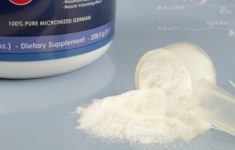Question that plagued ancient philosophers, thinkers, and voodoo doctors for thousands of years. Does creatine expire?
Can expired creatine still be a viable product for consumption? Should I take creatine at all?
Get your belt buckles on, because this one is gonna be a doozy.
Table of Contents
How Does Creatine Work?
Creatine is a natural molecule found in your body (primarily in muscle cells). Creatine is considered safe to consume and can be beneficial to your body (it’s one of the most well-studied supplements out there).
Creatine improves your strength gains and your overall performance at the gym. How does it work, you might ask?
When ingested into your body, creatine monohydrate turns into creatine phosphate. Creatine phosphate is then involved in creating a substance called adenosine triphosphate (ATP for short).
Increased levels of ATP (not the tennis association) are then used to give your muscles more energy for the necessary contractions. After ATP is exhausted from your body, phosphocreatine stores are then used to make more ATP.
Creatine also improves anabolic cell signalling in your muscles [1].
A lot of people use creatine because it plays a part in muscle recovery. So, it’s not only useful during your workout, but after it as well. Creatine’s effects are best felt during short duration high-intensity workouts (like sprints, weight lifting…).
If you decide to start taking creatine as a supplement you should keep in mind the expiration date of your store bought product.
Does Creatine Expire?
Creatine monohydrate is an extremely stable compound. Used as a supplement (if stored properly) it can last for a very long time. Then the obvious question you should be asking is how long is that?
Creatine monohydrate powder, studies have shown, starts breaking down after 4 years. Even if your product is stored at a high temperature of 60C (140F), creatine should be safe to use for at least 2-3 years [2].
So, what does that mean from my creatine supplement? Are you now telling me that I should keep it in an oven? At the same high temperatures, I would be slow-roasting my chicken? Well, no. Don’t do that!
Creatine, stored in a proper container, can be used much longer after its expiration date.
Stored in a cool, dry place, your creatine supplement could be safe to use long after the label says it’s expired (2, 3 years longer).
In order to avoid any problems with your creatine supplement, you should try to keep it away from moisture, because moisture may cause your creatine powder to harden.
Even if hardened creatine supplements are safe to use (but it’s potency may then be in question).
The only downside of using it after the date of expiration is that creatine can lose potency, which means that benefits you’d get from it will be much less pronounced.
This, of course, only relates to creatine supplements that are a couple of years old. We don’t want you finding your dad’s midlife crisis supplements from the nineties and consuming them.
They will make you sick!
What’s Creatine’s Shelf Life Once Opened?
Before telling you about creatine’s shelf life, you should always check your product for its sell by date and expiration date.
The expiration date may vary based on the types of creatine used and shelf life, and on the way you choose to store it.
There are different types of creatine? You didn’t mention that in the beginning. Tell us about them! Ok, sure.
Form of creatine, known as liquid creatine, can last much less than creatine powder. It expires much more quickly (it starts going off the moment it’s opened).
Other forms of creatine (creatine ethyl ester,etc.) if not kept correctly can break down more quickly into creatinine after their expiration date and are generally far less stable than creatine monohydrate [2].
Creatinine? Now, what is that (you might ask)?
Creatinine is a waste product, created by your muscles while breaking down the compound we’ve been talking about this whole time (Creatine! What did you think we were talking about?) [3].
Can Expired Creatine Make You Sick?
If you take anything after it’s expired, you should feel some side effects, right? This is coming from a person that accidentally drank a bottle of champagne from the sixties (it’s a long story).
Well, when it comes to creatine, even if you take it after it’s expired you should not feel sick.
Most of the side effects will come directly from your mind because we have been programmed not to use stuff after their expiration date (and correctly so, in most cases).
So, just for your own sanity, and the fact that creatine is not a luxury commodity (in most places on Earth) buy a new container.
Creatine is not that expensive, and to be fair, if you workout on a regular basis while supplementing with creatine, you should run out of it long before it goes bad.
How To Store Creatine?
If you store your creatine correctly it should last for a couple of years. By storing it correctly, I mean, that you should keep your creatine supplements in a dry and cool environment.
Do not keep it at room temperature! Even though it will be safe for consumption, your gains from it will be diminished!
How Long Can You Keep Creatine?
If kept properly, creatine monohydrate should be all right for about 2-3 times of Earth’s travels around the Sun (for flat earthers, I don’t have an answer).
Other types of creatine (like liquid creatine) can expire much faster and that is why you should always check for expiration dates!
How To Tell If Expired Creatine Has Gone Bad?
How to tell anything in this crazy world (2020 ftw!)? Using your senses.
If your creatine has changed colour, or if it has developed a strong odour you should stop taking it. This also involves the taste of your product. If it seems off, it probably is!
FAQ
Is It Safe To Use Expired Supplements Like Creatine?
Most of the time, and for most healthy people taking creatine is completely fine and should not cause any negative side effects (this assumes that you are using the recommended dose) [4].
After your creatine supplement has passed its expiration date choosing to consume it is completely up to you.
In a lot of cases, it’s extremely low-risk, but because of creatine’s low market price, general advice would be to just get a new batch.
Does Creatine Affect You Sexually?
This question is one of those questions that can keep you up at night. And the answer is simply: Yes, it can.
In what way? When you take creatine your testosterone levels go up. Increase in testosterone levels means a bigger sex drive and a more productive relationship with your partner (hopefully) [5].
Some studies also show that an increase in testosterone can cure erectile dysfunction.
I personally find divorce more effective in curing this problem, but as the old saying goes, to each his own.
When Is the Best Time to Take Creatine?
It depends on your workout routine and your goals. It’s totally fine to take creatine before or after your workout.
However, knowing when to take creatine can help you achieve better results.
Does Creatine Make You Fat?
In certain terms, yes. But it’s not really fat that you are gaining, but rather water. The technical term for it is fluid retention.
Therefore, when people think about creatine weight gain they are actually describing the water retention in muscle cells.
Creatine draws water into your muscles which can cause an increase in weight. Usually, this happens in your legs, arms or belly.
The Bottom Line
At long last, we have reached the end of this article. If you just scrolled to the end, don’t worry, we’ll summarize the whole thing for you in a couple of easily digestible sentences.
If kept properly in a cool and dry place, creatine will take longer to go bad.
Expiration dates are different depending on the type of creatine you choose to take. Avoid moisture (not in general, just when it comes to keeping your creatine container)!
Even expired creatine may be consumable, but with lessened potency. Always check the table of contents, and if necessary reach out to your doctor and ask for that sweet, sweet medical advice.
References
- https://pubmed.ncbi.nlm.nih.gov/18048590/
- https://pubmed.ncbi.nlm.nih.gov/21424716/
- https://jissn.biomedcentral.com/articles/10.1186/s12970-017-0173-z
- https://pubmed.ncbi.nlm.nih.gov/12701816/
- https://journals.lww.com/cjsportsmed/Abstract/2009/09000/Three_Weeks_of_Creatine_Monohydrate.9.aspx






